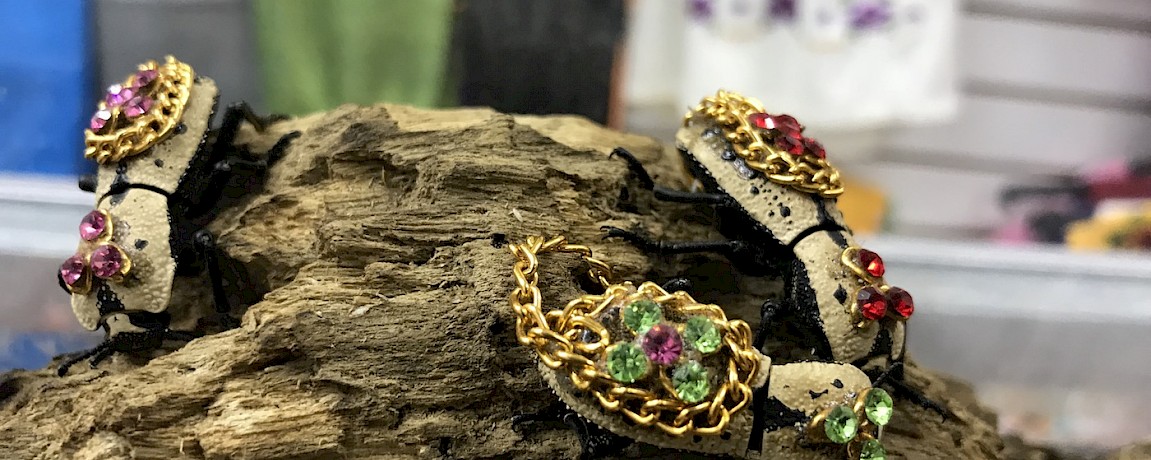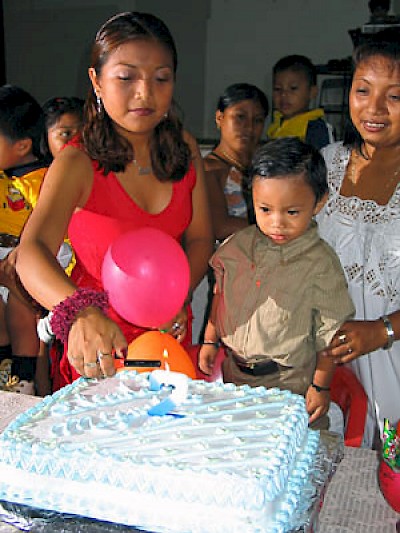What's in a (Spanish) Name?
If you aren't an aficionado of all things Mexican (which we weren't when we first moved to Yucatan), during your first few months of living here, you will meet people with names that are unfamiliar. Some of them are cute, some are funny and some are just downright odd.
Let's start with Spanish names. In our pre-Working Gringo days in California, we were familier with names like Jose, Jorge or Maria because California roots are, after all, Mexican. We suspect that perhaps many of the Mexicans we came in contact with may have adopted these more normal Spanish names to make life easier for themselves.
Upon immersing ourselves in Yucatan, we were confronted with names like Socorro, Izauro, Santiago and Ignacio... names that were definitely new to us. Some of these names (like the ones just mentioned), we found rather beautiful. Working Gringa's Spanish name is Elena, yet another beautiful name. But Working Gringo's name translated into Spanish has not been quite so painless. While "James" is a perfectly fine name in English, the Spanish version of James (pronounced "Hah-mess") is rather uncommon and not quite so pleasing. What's more, the alternative of Jaime always raises a chuckle from our Spanish-speaking friends - we're not sure why. Apparently, Santiago also means "James" and Working Gringo has found that much more amenable.
Of course, if you don't like your name, there is always the option of a nickname. Nicknames are popular here, but connections to their antecedents have not always been obvious to us. Here are some Mexican nicknames that we have run across and the "given" names that they are related to:
- Jesús (a common name here) becomes Chucho
- José becomes Pepe
- Ignacio becomes Nacho
- Socorro becomes Soco or Coco
- Maria Elena becomes Malena
- Eugenia becomes Genny (pronounced "Henny")
- Beatriz becomes Betty
- Concepcion becomes Conchi
- and so on...
Then there are the stranger dimunitives. There is a popular hardware store in the Yucatan named Boxito. From our Mayan language studies, we have learned that box means "black" and the Spanish suffix -ito means "little". As it turns out, we were right! Boxito is a nickname given to a little guy who has dark skin. It is a dimunitive name, given out of affection or familiarity, not out of disrespect. And it was probably the nickname of the man who started this very successful chain of stores. Other dimunitives in that vein are Flaco (skinny man), Gorda (fat female), Gordita (little fat female), Guera (white woman), Guapo (handsome man), Rubia (blonde woman). And of course, just change the "a" to "o" or vice-versa, and the name gets a sex change. Fun and easy!
While we're on the subject, the habit of adding dimunitives to names is a charming one and we're not sure how we lived without it before now. Mama becomes mamacita, abuelo becomes abuelito, gata becomes gatita and the list goes on ad infinitum. If you work at it hard enough, you can add -ito or -ita to almost anything and that thing is suddenly little, cute and endowed with charm and endearment. Of course, this is also used for names: Lupe becomes Lupita (at least one cafe in every town in Mexico is Cafe Lupita), Estrella becomes Estrellita, Angel becomes Angelito, etc.
But our favorites are the names we would never have thought of in a million lifetimes. Our assistant, the Amazing Beatriz, has told us about people she has met (more than one!) named Annirev. We pondered over that for a few minutes when we heard it but she finally had to tell us that it is the abbreviation for Anniversaire de Revolución (The Anniversary of the Revolution), which is the way the holiday on November 20 is often presented on a calendar.
We ourselves have met more than one young woman named Leydi Diana. All the Leydi's we have met seem to be in their early twenties... hmmm! Certainly not a coincidence.
The Amazing Beatriz also told us about a story she read in the local paper a few years back. There was a local whose name was Onecent (pronounced "OHN-neh-sent"). We puzzled over this one too but she told us not to bother. The story was that the father of Onecent had been out in the milpa (corn field) one day, and he had found a coin on the ground. On it, the coin had the letters ONE CENT and when his son was born later that day, he was so named. He could have been named Ingodwetrust ("een-gohd-WAY-troost") but that probably didn't trip off the tongue quite so lightly.
When we were researching this article, we found a story from last summer about the Mexican government cracking down on "strange" baby names, trying to save their little citizens (paisanitos?) from future embarassment in the schoolyard. Apparently, inventive names are a Mexican tradition and a custom that we think is rather endearing. Adorable. Charming. It's a customita! (Okay, so it doesn't work all the time...)
Have you heard any interesting names here in the Yucatan? Please tell us... we're fascinated!









Comments
Luis Gustavo 17 years ago
Hi.
Really interesting webpage here...
In my family there seems to be a tradition to use Firstname and middle name, added with two last names as already mentioned... which is also the way that soap operas create names for their characters... so everyone in my family has rather... "theatrical" names.
I'm Luis Gustavo Padilla López (Sorry if I dont try to put it in the english sound of it)
Usually in web forms there's not enough space for my full name so I use a shorter version for it.
So My brothers are called: Jorge Luis and Luis David (I have two male brothers), My mom is called Maria Esther and my dad is Luis Arnoldo...
I told you... Theatrical names
The reason all of the children are called Luis is obviously because of my dad but there's more to it.
I'm the youngest of the 3 of us, so I'll start from the older.
The first baby was born... a Baby boy!!! he had to be called like his dad... but "Arnoldo" is not considered a nice name... so they only used Luis, but "Luis" is too simple so they called him Luis David.
Then the second boy was born and exactly on St. Luis day... so thank's to the coincidence he was called "Luis", so Jorge Luis he is.
Then the third one, the most handsome, the smartest one, the sexy one (well, maybe not then) was born (that's me of course) and I HAd to be called after my dad as well, otherwise people would think I'm the milk-man son so my name came to be Luis Gustavo.
As for nick names:
Maria Esther: Nena (nothing to do with her name but she was the first girl on a family of 10 brothers so they called her "baby" which translates as Nena) she is almost 60 and is still "La Nena" the baby
Luis Arnoldo: Nono (when he was younger he had a nephew who couln't pronounce his name and turned "Arnoldo" to "Anono" and then to "Nono") Again mi dad is over 60 and many of my cousins doesn't even now his name hi is just Nono
Luis David: Luisda (just shorter since theatrical names are too long)
Jorge Luis: Jois (Jorge, but in cute. He is 30 Y.O. now so he doesn't really like his nickname)
Luis Gustavo: El Güero (stands for blond, when I was younger I had blond hair, but that was then, still, 27 years later I'm still "El Güerito"
And there's more and more names with my cousins uncles and so... but I have a 60 persons family and this is not my blog so I will not intrude... so much
Reply
CasiYucateco 17 years ago
Christina, A good account of "Why Guadalupe?" is found here: http://www.sancta.org/nameguad.html
"Guadalupe" is not the same as "Mary" but is the name or description used by the Virgin Mary's apparition to (now Saint) Juan Diego on the hill of Tepeyac near Mexico City from December 9 through December 12, 1531.
The short version: "Guadalupe" is an old term from Spain, used as both a male or female name and originally a description of terrain - a river. One theory is that when the Virgin Mary spoke to Juan Diego en Nahuatl, she used the word "coatlaxopeuh" which is pronounced "quatlasupe", almost identical to Guadalupe -- a word already familiar to the Spanish bishop-elect Juan de Zumárraga.
Much more about La Virgin Morena at: http://www.sancta.org/
Reply
Gloria 17 years ago
Hi Ben, there's some mayan names not too common but you can find some people with this names. Right now only one comes to my mind "Nicte-ha" that means flower of water.
Reply
Carol Ann 17 years ago
What would my name be in Mayan or Spanish if my name is Carol Ann???? Thank You
Reply
Joyce 17 years ago
How do you pronounce, or what would my nickname be?
Reply
Meagan 17 years ago
My boyfriend is Peruvian and named Jorge, but has always been called Coco. Does anyone know the history of this nickname for Jorge?
Reply
Ecabrera 17 years ago
Many people in Yucatán call "Us" to those named Eusebio.
Reply
Ben 17 years ago
Hey, just wanted to correct something - the 'x' used to be pronounced like 'sh' in Spanish up until about the 16th century, which is why it was used to represent the 'sh' sound in the indigenous languages. The Aztecs called themselves the 'Mexica' (pronounced Meshika) which is where 'Mexico' comes from. At the time, the 'j' was pronounced like the French 'j' (or the 's' in 'treasure'). After the 16th century, the 'j' started to sound like the 'x' (like 'sh'), and then all of the 'sh' sounds began to sound like the modern Spanish 'j'.
Hope that clears things up.
-Ben the Linguist
PS. Anybody know of any lists of common Mayan names?
Reply
Ecabrera 17 years ago
There are more:
Gameba (a mix of Gaspar, Melchor y Baltasar) given to people born on January 6th.
Anivderev (Given to a child who was born in November 20, it comes on the civic calendar)
Usnavy Marina (Someone sent her IFE id to my mail)
Franger (a mix of Francisco and Gertrudis, his parent´s names he lives in Pacabtun)
Reply
Christina 17 years ago
My g.g. grandmother's name was Guadalupe Prieto, when searching for her the only names that came up in New Mexico was Maria Andrea Prieto and Juana Prieto. Is it true the eldest daughter takes the name of Maria. Does Guadalupe stand for Maria also. Like the Virgin Mary (Guadalupe)?
Reply
Working Gringos 17 years ago
Deanna, your name would probably work as "Diana" and be pronounced the same way you pronounce it now. David is "dah-VEED" and is common here.
Reply
« Back (30 to 41 comments)Next »